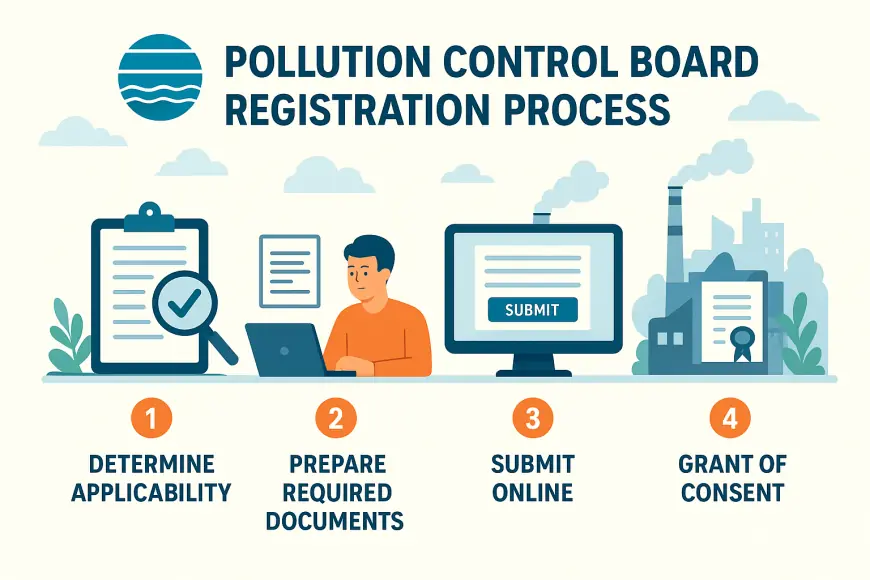Step-by-Step Guide to Pollution Control Board Registration Process
Industrial development, while essential for economic growth, can often lead to environmental pollution if not regulated properly. To ensure industries comply with environmental standards, the government of India has established Pollution Control Boards (PCBs) at the central and state levels. These boards oversee and regulate industrial activities that may impact air, water, and soil quality. One of the critical regulatory requirements for industries is obtaining registration or consent from the Pollution Control Board. This article provides a comrehensive overview of the Pollution Control Board registration process.

What is Pollution Control Board Registration?
Pollution Control Board registration, often referred to as obtaining “Consent to Establish” or “Consent to Operate,” is a legal requirement for businesses and industries whose activities have the potential to cause environmental pollution. The registration ensures that the organization complies with the environmental laws and follows prescribed standards for emissions, waste management, and other environmental safeguards.
There are two main types of consent:
-
Consent to Establish (CTE): Required before setting up a new industry or factory.
-
Consent to Operate (CTO): Required to operate an existing industry or factory legally.
Who Needs Pollution Control Board Registration?
The registration is mandatory for various industries, including but not limited to:
-
Manufacturing units
-
Chemical and pharmaceutical industries
-
Food processing units
-
Metal processing units
-
Waste treatment and disposal facilities
-
Power plants
Essentially, any industry that generates emissions or discharges waste into the environment must obtain PCB consent.
Steps to Register with the Pollution Control Board
The process for registration may vary slightly from state to state, but the general steps remain the same:
-
Determine Applicability
Identify whether your industry falls under the category requiring PCB consent. Different states classify industries based on the scale of operations and pollution potential, often categorized as red, orange, or green. -
Prepare Required Documents
Typical documents needed include:-
Detailed project report (DPR) or project layout plan
-
Site plan and location map
-
Details of raw materials and production process
-
Pollution control measures and equipment details
-
Water and energy consumption details
-
Copy of Environmental Impact Assessment (if applicable)
-
-
Submit Application Online or Offline
Most state PCBs, such as the Karnataka State Pollution Control Board (KSPCB) or the Gujarat Pollution Control Board (GPCB), allow online submission through their official portals. The application includes filling out forms, uploading documents, and paying the required fees. -
Application Scrutiny
After submission, the Pollution Control Board reviews the application to ensure compliance with environmental regulations. This may involve site inspections and verification of pollution control measures. -
Grant of Consent
Once the PCB is satisfied, it grants the “Consent to Establish” or “Consent to Operate,” usually for a specified period. Some consents are valid for five years and need renewal thereafter. -
Compliance and Renewal
Industries must comply with the stipulated environmental norms. Regular monitoring and reporting of emissions, effluent discharge, and other environmental parameters are mandatory. Consent renewal is required before expiry to continue operations legally.
Importance of PCB Registration
-
Legal Compliance: Avoids legal penalties, fines, or closure of operations.
-
Environmental Responsibility: Encourages industries to adopt eco-friendly practices.
-
Sustainable Development: Ensures industrial growth without harming the environment.
-
Public Safety: Reduces risks associated with industrial pollution for surrounding communities.
Conclusion
Pollution Control Board registration is not just a regulatory requirement but a crucial step toward sustainable industrial development. By following the registration process diligently, businesses can operate responsibly while contributing to environmental protection. With increasing awareness of environmental conservation, obtaining PCB consent has become an essential part of industrial planning in India. Industries must stay updated with state-specific regulations and renew their consent timely to ensure uninterrupted operations.
What's Your Reaction?
 Like
0
Like
0
 Dislike
0
Dislike
0
 Love
0
Love
0
 Funny
0
Funny
0
 Angry
0
Angry
0
 Sad
0
Sad
0
 Wow
0
Wow
0
















































